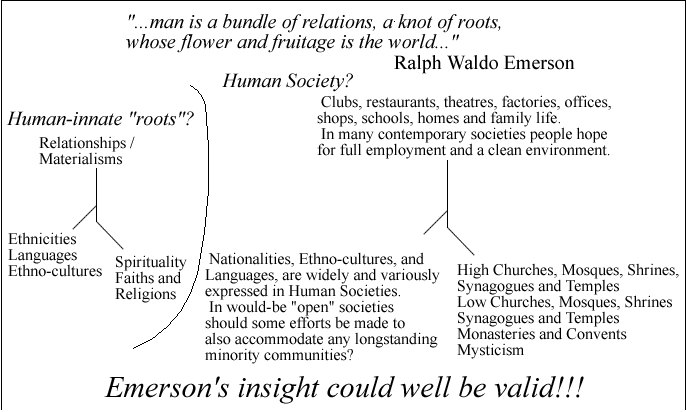Philosophy is Dead
Professor Stephen Hawkings quotations

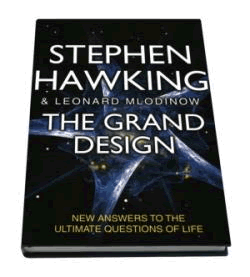 The have been two notable instances recently of Professor Stephen Hawking, perhaps the most famous scientist of the day,
going so far as to pronounce that philosophy is dead.
The have been two notable instances recently of Professor Stephen Hawking, perhaps the most famous scientist of the day,
going so far as to pronounce that philosophy is dead.
The first of these occured in Stephen Hawkings recent book, The Grand Design: new answers to the ultimate questions of life (co-authored with Leonard Mlodinow and on sale from early September, 2010).
Chapter I ~ The Mystery of Being ~ actually begins on this theme:-
We each exist for but a short time, and in that time explore but a small part of the
whole universe. But humans are a curious species. We wonder, we seek answers. Living in this
vast world that is by turns kind and cruel, and gazing at the immense heavens above, people have
always asked a multitude of questions: How can we understand the world in which we find
ourselves? How does the universe behave? What is the nature of reality? Where did all this come
from? Did the universe need a creator? Most of us do not spend most of our time worrying about
these questions, but almost all of us worry about them some of the time.
Traditionally these are questions for philosophy, but philosophy is dead. Philosophy has not kept up with modern developments in science, particularly physics. Scientists have become the bearers of the torch of discovery in our quest for knowledge. The purpose of this book is to give the answers that are suggested by recent discoveries and theoretical advances. They lead us to a new picture of the universe and our place in it that is very different from the traditional one, and different even from the picture we might have painted just a decade or two ago.
The second instance of Stephen Hawkings pronouncing on this theme was delivered during his forty-minute presentation
on the subject "Why are we here?" given at an high profile "Google Zeitgeist" sponsored conference held in Hertfordshire, close to London, on
16 May, 2011 and was, ~ to a large degree, ~ a
re-statement of the opening selection from "The Grand Design" as already quoted.
Traditionally these are questions for philosophy, but philosophy is dead. Philosophy has not kept up with modern developments in science, particularly physics. Scientists have become the bearers of the torch of discovery in our quest for knowledge. The purpose of this book is to give the answers that are suggested by recent discoveries and theoretical advances. They lead us to a new picture of the universe and our place in it that is very different from the traditional one, and different even from the picture we might have painted just a decade or two ago.
During his presentation Stephen Hawking said that fundamental questions about the nature of the universe could not be resolved without hard data such as that currently being derived from the Large Hadron Collider and space research.
"Most of us don't worry about these questions most of the time. But almost all of us must sometimes wonder: Why are we here? Where do we come from? Traditionally, these are questions for philosophy, but philosophy is dead," he said. "Philosophers have not kept up with modern developments in science. Particularly physics."
Prof Hawking went on to claim that "Scientists have become the bearers of the torch of discovery in our quest for knowledge." He said new theories "lead us to a new and very different picture of the universe and our place in it".

Stephen Hawking is acknowledged as being a complete whizz at math and physics and, as such, is possibly qualified to consider such questions as ~ How does the physical universe behave?
Yet, it could well be that the assertion that ~ philosophy is dead ~ goes too far as a case can surely be made that Prof. Hawking is rather less well qualified to pose the question ~ How can we understand the human world in which we find ourselves?
We would suggest that a meaningful and worthwhile answers to questions about ~ "The Human World" ~ might well rely of psycholgical, philosophical and historical insights rather than on math and physics!!!
Ralph Waldo Emerson
RALPH WALDO EMERSON (1803-1882) was, in his time, the leading voice of intellectual culture in the United States. He remains widely influential to this day through his essays, lectures, poems, and philosophical writings.
In the later eighteen-twenties Ralph Waldo Emerson read, and was very significantly influenced by, a work by a French philosopher named Victor Cousin.
A key section of Cousin's work reads as follows:
"What is the business of history? What is the stuff of which it is made? Who is the personage of history? Man : evidently man and human nature.
There are many different elements in history. What are they? Evidently again, the elements of human nature. History is therefore the development of humanity,
and of humanity only; for nothing else but humanity develops itself, for nothing else than humanity is free. …
… Moreover, when we have all the elements, I mean all the essential elements, their mutual relations do, as it were, discover themselves. We draw from the nature of these different elements, if not all their possible relations, at least their general and fundamental relations."
Introduction to the History of Philosophy (1829)
… Moreover, when we have all the elements, I mean all the essential elements, their mutual relations do, as it were, discover themselves. We draw from the nature of these different elements, if not all their possible relations, at least their general and fundamental relations."
Introduction to the History of Philosophy (1829)
Even before he had first read Cousin, (in 1829), Emerson had expressed views in his private Journals which suggest that he accepted that Human Nature, and Human Beings, tend to display three identifiable aspects and orientations:
Imagine hope to be removed from the human breast & see how Society will sink, how the strong bands of order & improvement will be relaxed & what a deathlike stillness would take the place of the restless energies that now move the world. The scholar will extinguish his midnight lamp, the merchant will furl his white sails & bid them seek the deep no more. The anxious patriot who stood out for his country to the last & devised in the last beleagured citadel, profound schemes for its deliverance and aggrandizement, will sheathe his sword and blot his fame. Remove hope, & the world becomes a blank and rottenness.
(Journal entry made between October and December, 1823)
In all districts of all lands, in all the classes of communities thousands of minds are intently occupied, the merchant in his compting house, the mechanist over his plans, the statesman at his map, his treaty, & his tariff, the scholar in the skilful history & eloquence of antiquity, each stung to the quick with the desire of exalting himself to a hasty & yet unfound height above the level of his peers. Each is absorbed in the prospect of good accruing to himself but each is no less contributing to the utmost of his ability to fix & adorn human civilization. (Journal entry of December, 1824)
Our neighbours are occupied with employments of infinite diversity. Some are intent on commercial speculations; some engage warmly in political contention; some are found all day long at their books … (This dates from January - February, 1828)
In all districts of all lands, in all the classes of communities thousands of minds are intently occupied, the merchant in his compting house, the mechanist over his plans, the statesman at his map, his treaty, & his tariff, the scholar in the skilful history & eloquence of antiquity, each stung to the quick with the desire of exalting himself to a hasty & yet unfound height above the level of his peers. Each is absorbed in the prospect of good accruing to himself but each is no less contributing to the utmost of his ability to fix & adorn human civilization. (Journal entry of December, 1824)
Our neighbours are occupied with employments of infinite diversity. Some are intent on commercial speculations; some engage warmly in political contention; some are found all day long at their books … (This dates from January - February, 1828)
The quotes from Emerson are reminiscent of a line from another "leading voice of intellectual culture" - William Shakespeare.
There's neither honesty, manhood, nor good fellowship in thee.
William Shakespeare: Henry IV (Pt 1), Act I, Scene II
William Shakespeare: Henry IV (Pt 1), Act I, Scene II
"The first glance at History convinces us that the actions of men proceed from their needs, their passions, their characters and talents; and impresses us with the belief that such needs, passions and interests are the sole spring of actions."
Georg Hegel, 1770-1831, German philosopher, The Philosophy of History (1837)
Plato, Socrates and Shakespeare endorse a 'Tripartite Soul' view of Human Nature. Platos' Republic
Understanding the Past and Present. Why is the World the way it is today?
Understanding the Past and Present. Why is the World the way it is today?
Some Human Mysteries
"You will hear things like, "Science doesn't know everything." Well, of course science doesn't know everything. But,
because science doesn't know everything, it doesn't mean that science knows nothing. Science knows enough for us to
be watched by a few million people now on television, for these lights to be working, for quite extraordinary
miracles to have taken place in terms of the harnessing of the physical world and our dim approaches towards
understanding it. And as Wittgenstein quite rightly said, "When we understand every single secret of the universe,
there will still be left the eternal mystery of the human heart."
Stephen Fry quoting Wittgenstein during a Room 101 TV program
Stephen Fry quoting Wittgenstein during a Room 101 TV program
Human Being seems
to be rather "Tripartite"
It is widely known that Plato, pupil of and close friend to Socrates, accepted that Human
Beings have a " Tripartite Soul " where the individual Human Psyche is composed of three aspects -
Wisdom-Rationality, Spirited-Will and Appetite-Desire.
What is less widely appreciated is that such major World Faiths as Christianity, Islam, Hinduism, Buddhism and Sikhism see "Spirituality" as being relative to "Desire" and to "Wrath".
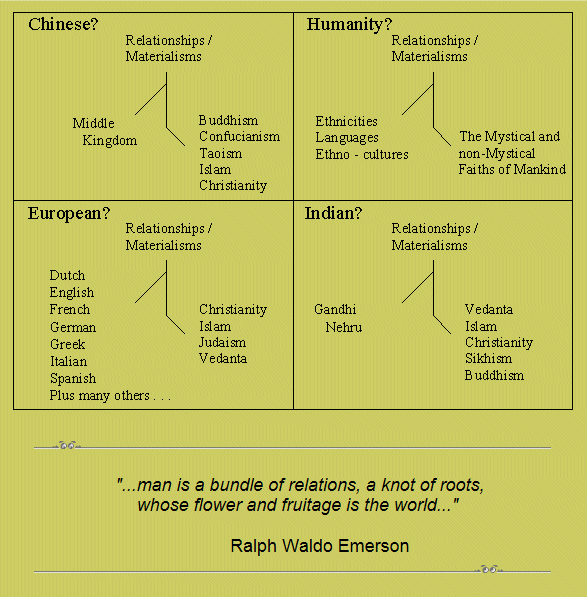
"bundles of relations and knots of roots"
tend to contribute towards giving rise to the "World" of Human Societies!!!
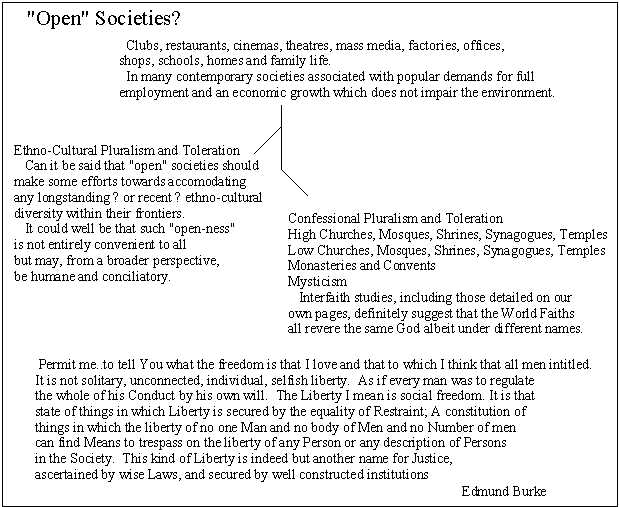
Although this may well depend on such things as:-
How "socio-politically doctrinaire" an individual society might be.
(Societies committed to Marxist ideology, for example, may not be particularly "Tripartite").
Key insights are available here at Age-of-the-Sage,
(from the Great Faiths, Plato, Socrates, Pythagoras, Shakespeare and Emerson!!!),
that give convincing support to such a depiction of Human Nature!!!
Believe it or not even SCIENCE seems to agree with such a view!!!
"Whatever concept one may hold, from a metaphysical point of view, concerning the freedom of the will, certainly its appearances,
which are human actions, like every other natural event, are determined by universal laws. However obscure their causes, history,
which is concerned with narrating these appearances, permits us to hope that if we attend to the play of freedom of the human will
in the large, we may be able to discern a regular movement in it, and that what seems complex and chaotic in the single individual
may be seen from the standpoint of the human race as a whole to be a steady and progressive though slow evolution of its original endowment."
Immanuel Kant
Idea for a Universal History from a Cosmopolitan Point of View (1784)
Immanuel Kant
Idea for a Universal History from a Cosmopolitan Point of View (1784)
Or to quote Emerson, from his famous Essay ~ History more fully:-
"In old Rome the public roads beginning at the Forum proceeded north, south, east, west, to the centre of every province of the empire, making each market-town of Persia, Spain, and Britain pervious to the soldiers of the capital: so out of the human heart go, as it were, highways to the heart of every object in nature, to reduce it under the dominion of man. A man is a bundle of relations, a knot of roots, whose flower and fruitage is the world. His faculties refer to natures out of him, and predict the world he is to inhabit, as the fins of the fish foreshow that water exists, or the wings of an eagle in the egg presuppose air. He cannot live without a world."
"In old Rome the public roads beginning at the Forum proceeded north, south, east, west, to the centre of every province of the empire, making each market-town of Persia, Spain, and Britain pervious to the soldiers of the capital: so out of the human heart go, as it were, highways to the heart of every object in nature, to reduce it under the dominion of man. A man is a bundle of relations, a knot of roots, whose flower and fruitage is the world. His faculties refer to natures out of him, and predict the world he is to inhabit, as the fins of the fish foreshow that water exists, or the wings of an eagle in the egg presuppose air. He cannot live without a world."

"There is one mind common to all individual men....
....Of the works of this mind history is the record. Man is explicable by nothing less than all his history. All the facts of history pre-exist as laws. Each law in turn is made by circumstances predominant. The creation of a thousand forests is in one acorn, and Egypt, Greece, Rome, Gaul, Britain, America, lie folded already in the first man. Epoch after epoch, camp, kingdom, empire, republic, democracy, are merely the application of this manifold spirit to the manifold world."
From Ralph Waldo Emerson's Essay ~ History
....Of the works of this mind history is the record. Man is explicable by nothing less than all his history. All the facts of history pre-exist as laws. Each law in turn is made by circumstances predominant. The creation of a thousand forests is in one acorn, and Egypt, Greece, Rome, Gaul, Britain, America, lie folded already in the first man. Epoch after epoch, camp, kingdom, empire, republic, democracy, are merely the application of this manifold spirit to the manifold world."
From Ralph Waldo Emerson's Essay ~ History

"Mankind are so much the same, in all times and places, that history informs us of nothing new or strange in this particular. Its chief use is only to discover the constant
and universal principles of human nature."
David Hume
Does all of this psychological and philosophical insight demonstate that Hawking and Mlodinow's assertion that
~ philosophy is dead ~ rather overstates the case?
David Hume

Mention has been made of such undoubtedly celebrated philosophers, within the Western tradition, as Plato and Kant.
This sort of a "Metaphysical & Tripartite" approach to Existence has, however, been long identified by Eastern philosophy:-
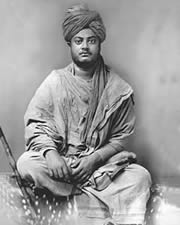
The eminent Indian holy man Vivekananda, (actually a name-in-religion suggestive of "the bliss of discerning wisdom"), lived between 1863-1902.
He personally made a massively favorable impression upon the World Congress of Religions held in Chicago in 1893 and is credited with being a key figure in the broader introduction of Indian philosophy to the Western world.
According to Vivekananda :-
Religion deals with the truths of the metaphysical world just as chemistry and the other natural sciences deal with the truths of the physical world. The book one
must read to learn chemistry is the book of nature. The book from which to learn religion is your own mind and heart. The sage is often ignorant of physical science,
because he reads the wrong book - the book within; and the scientist is too often ignorant of religion, because he too reads the wrong book - the book without.
More details on such Eastern philosophic approaches are available via this link:-
More details on such Eastern philosophic approaches are available via this link:-

